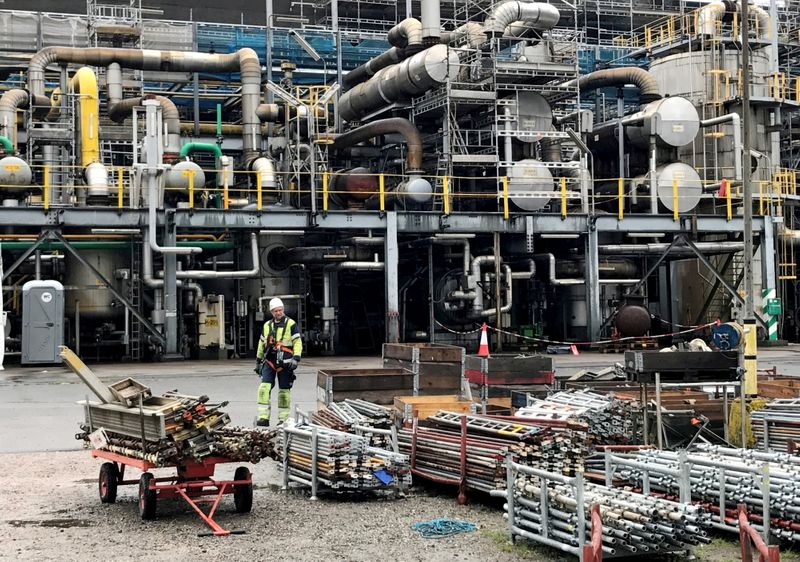Soaring gas prices ripple through heavy industry, supply chains By

© Reuters. FILE PHOTO: A worker walks at the Yara ammonia plant in Porsgrunn, Norway August 9, 2017. REUTERS/Lefteris Karagiannopoulos
2/3
By Bozorgmehr Sharafedin, Susanna Twidale and Roslan Khasawneh
LONDON (Reuters) – Global record high prices are pushing some energy-intensive companies to curtail production in a trend that is adding to disruptions to global supply chains in some sectors such as food and could result in higher costs being passed on to their customers.
Some companies, including steel producers, fertiliser manufacturers and glass makers, have had to suspend or reduce production in Europe and Asia as a result of spiking energy prices. That includes two of the world’s largest fertiliser makers, which said they would cut production in Europe. The UK on Tuesday said it agreed to provide state support to one of the companies to restart production of by-product carbon dioxide, which is used in food production, to avert a supply crunch.
Natural gas prices have risen sharply around the globe in recent months. That has been due to a combination of factors: including increased demand particularly from Asia due to a post-pandemic recovery; low gas inventories; and tighter-than-usual gas supplies from Russia.
Gas prices in Europe have risen more than 250% this year, while Asia has seen about a 175% increase since late January. In the United States, prices have surged to multi-year highs and are about double where they were at the start of the year. Electricity prices have also risen sharply as many power plants are gas-fired.
Industrial Energy Consumers of America, a trade group representing chemical, food and materials manufacturers, has in recent days called on the U.S. Department of Energy to stop the country’s liquefied natural gas producers from exporting gas to help keep the energy costs down for industry.
Additional supplies of gas could alleviate pressure. Norway has allowed increased gas exports. More supply could flow from Russia by the end of the year with the country’s new Nord Stream 2 pipeline awaiting approval from Germany’s energy regulator. The pipeline project has drawn criticism from the United States, which says it will increase Europe’s reliance on Russian energy supplies.
PRODUCTION DISRUPTIONS
The pressures so far have been particularly acute in Europe, where gas stocks are much lower than usual heading into winter. Norway’s Yara International (OTC:) ASA, one of the world’s largest fertiliser makers, on Friday said it would cut about 40% of its European ammonia production due to high gas prices. That came after U.S.-based CF Industries Holdings Inc (NYSE:) said gas prices were prompting it to halt operations at two of its British plants. Natural gas is the most important cost input for nitrogen-based chemicals and fertilizers.
Yara’s chief executive, Svein Tore Holsether, told Reuters in an interview Monday that the company was bringing ammonia to Europe from production facilities…
Read More: Soaring gas prices ripple through heavy industry, supply chains By
